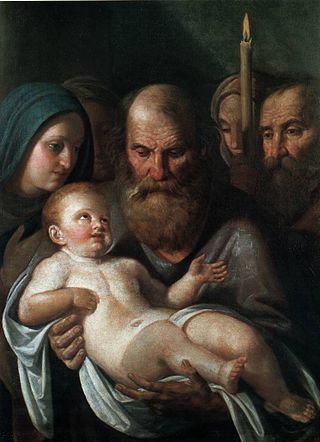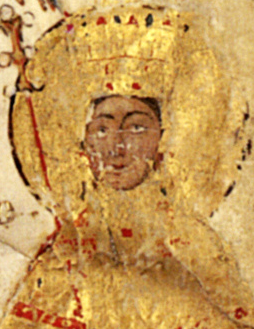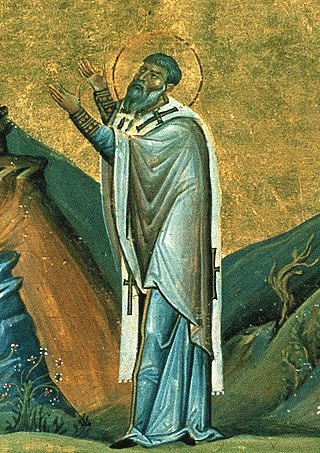Related Research Articles

The Church of the Holy Sepulchre, also known as the Church of the Resurrection, is a fourth-century church in the Christian Quarter of the Old City of Jerusalem. It is considered to be the holiest site for Christians in the world, as it has been the most important pilgrimage site for Christianity since the fourth century.

Flavia Julia Helena, also known as Helena of Constantinople and in Christianity as Saint Helena, was an Augusta of the Roman Empire and mother of Emperor Constantine the Great. She was born in the lower classes traditionally in the Greek city of Drepanon, Bithynia, in Asia Minor, which was renamed Helenopolis in her honor, although several locations have been proposed for her birthplace and origin.

The calendar of saints is the traditional Christian method of organizing a liturgical year by associating each day with one or more saints and referring to the day as the feast day or feast of said saint. The word "feast" in this context does not mean "a large meal, typically a celebratory one", but instead "an annual religious celebration, a day dedicated to a particular saint".

The True Cross is said to be the real cross that Jesus of Nazareth was crucified on, according to Christian tradition.

In the Christian liturgical calendar, there are several different Feasts of the Cross, all of which commemorate the cross used in the crucifixion of Jesus. Unlike Good Friday, which is dedicated to the passion of Christ and the crucifixion, these feast days celebrate the cross itself, as the sign of salvation. In Western Catholicism, Eastern Catholicism, Eastern Orthodoxy, Oriental Orthodoxy, Lutheranism and Anglicanism the most common day of commemoration is 14 September, or 27 September in churches still using the Julian calendar.
Alphaeus is a man mentioned in the New Testament as the father of two of the Twelve Apostles: Matthew the Evangelist and James, son of Alphaeus.

May 20 - Eastern Orthodox Church calendar - May 22
Equal-to-apostles or equal-to-the-apostles is a special title given to some saints in Eastern Orthodoxy and in Byzantine Catholicism. The title is bestowed as a recognition of these saints' outstanding service in the spreading and assertion of Christianity, comparable to that of the original apostles.

May 25 - Eastern Orthodox Church calendar - May 27

Meskel is a Christian festival in the Ethiopian Orthodox and Eritrean Orthodox churches that commemorates the discovery of the True Cross by the Roman Empress Helena in the fourth century. Meskel occurs on the 17 Meskerem in the Ethiopian calendar. "Meskel" is Amharic for "cross".

Simeon at the Temple is the "just and devout" man of Jerusalem who, according to Luke 2:25–35, met Mary, Joseph, and Jesus as they entered the Temple to fulfill the requirements of the Law of Moses on the 40th day from Jesus' birth, i. e. the presentation of Jesus at the Temple.

Helena Dragaš was the empress consort of Byzantine emperor Manuel II Palaiologos and mother of the last two emperors, John VIII Palaiologos and Constantine XI Palaiologos. She served as regent after the death of her son John VIII in 1448 until 1449. She is born into the Serbian Dejanović noble family.

Stefan Štiljanović was the last prominent Serbian nobleman of the period of Ottoman subjugation of Serbia, and according to folklore, he was the last Despot of Serbia. He ruled a large territory under the Hungarian crown, due to his famed operations against the Ottoman Empire in the frontiers. Štiljanović is venerated as a Saint in the Serbian Orthodox Church on the 4 October or 17 October which comes to the same thing.
Abercius is a masculine given name that may refer to:

Abercius of Hieropolis was a bishop of Hierapolis at the time of Roman emperor Marcus Aurelius, also known as Abercius Marcellus. It is generally considered that he was the successor to Papias.

Saint Hilary of Galeata is venerated as a saint in the Catholic and Eastern Orthodox churches. His feast day is 15 May.

October 21 - Eastern Orthodox liturgical calendar - October 23

Saint Demiana and the 40 Virgins was a Coptic martyr of the early fourth century.

Stephen is traditionally venerated as the protomartyr or first martyr of Christianity. According to the Acts of the Apostles, he was a deacon in the early Church at Jerusalem who angered members of various synagogues by his teachings. Accused of blasphemy at his trial, he made a speech denouncing the Jewish authorities who were sitting in judgment on him and was then stoned to death. Saul of Tarsus, later known as Paul, a Pharisee and Roman citizen who would later become a Christian apostle, participated in Stephen's martyrdom.
References
- ↑ "Orthodox Synaxarion May Lives of the Saints with icons". www.holyresurrection.us. Archived from the original on 2016-03-26. Retrieved 2017-06-07.